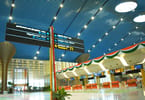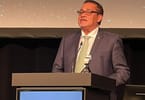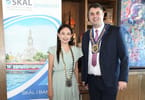With salaries as high as US$600,000 plus perks, such as first-class travel accommodations and all-expenses paid, it is no wonder high-ranking executives latch on to their jobs. But, as new details are emerging, it seems two top executives have asked to be relieved of their positions much earlier than they were “elected” for.
Let’s examine on the surface what it is that these executives do, from my experience, in attending so-called summits. Top executives for organizations like the Pacific Asia Travel Association and the United Nations World Tourism Organization, have jobs that merely entail showing up, reading a speech that was likely prepared for them, be present in photo ops, attend dinners and attend more dinners. Unless anyone can shed some light on real decision-making opportunities for these executives, it does not seem like they have been working hard for their money.
In June this year, the secretary-general of the United Nations World Tourism Organization, Francisco Frangialli, indicated he wanted out. According to him, he is stepping down at the start of next year to ensure a smooth transition before the scheduled end of his final term in office to presumably guarantee a “smooth transition” for the next secretary-general. However, Frangialli’s term does not end for another year. It is questionable because such a move means he is leaving his post almost a full year before his scheduled departure. There is dissonance with his departure and the issue of transition as election for his position has yet to take place.
Frangialli, for his part, has said his main achievements as secretary-general included “the creation of a universally-accepted system to measure the impact on tourism on national economies and the adoption of the Global Code of Ethics for Tourism to encourage responsible and sustainable tourism.”
Trumpeting the same “transition” excuse is Pacific Asia Travel Association’s CEO and president Peter de Jong who has “requested that his departure date be reviewed and advanced to October 17, 2008 in order to take advantage of new professional opportunities.” De Jong is leaving his post six months ahead of his term. His departure comes as a surprise indicating he all too suddenly wants out, especially since PATA has been under intense public and media scrutiny because of the organization’s declining numbers and since the organization’s finance has been made public. De Jong fought arduously to dismiss PATA’s detractor telling them to “get a life.”
De Jong claimed that PATA’s proudest recent achievement is “without a doubt, the PATA CEO Challenge (PCC), which convened a cross-section of the Asia Pacific and global travel and tourism industry leaders for the sole purpose of sharing practical initiatives to combat climate change in our industry.” He added, “We will now share our findings with local and regional markets to help local operators, our chapters and smaller companies reduce their carbon footprint.”
De Jong had this much to say, “Looking back over the past years, so many highlights come to mind – I recall our ‘Welcome Back’ campaign after SARS, which launched our advocacy platform; the resumption of control over the PATA Travel Mart and its consistent success thereafter; the creation of a dynamic, new corporate identity for PATA, only the third in its history; the Total Tourism concept we developed, as we adopted our mantra to “promote travel to, from and within Asia Pacific;” the subsequent launch of the Allied Partner category, to embrace tourist boards outside our geographic boundaries; the opening of our offices in China and Dubai; the financial health and reserves we have managed to build for PATA through revenue growth and frugal financial management; the growing recognition we have obtained from international bodies and the partnership opportunities we have created; the PATA CEO Challenge we so successfully launched earlier this year and which reconnects us with a new generation of industry leaders; the re-invigoration of our charitable arm, the PATA Foundation and our assistance to Bali, Chengdu, Phuket, Sri Lanka and other destinations in times of crisis.”
He also said, “Much work remains undone and many challenges lie ahead for you and for my successor. But our vitality, our experience and our know-how, coupled with the growing recognition and respect that we have earned around the world, will stand us in good stead as we face a complex but exciting future.” (So, tell us again why you are leaving early?)
Fragialli and de Jong’s departures beg the question: If they were doing so great, why are Frangialli and de Jong leaving way before their terms are up and why in such a rush to leave? This much is clear – no matter how great the legacy they are supposed to have left, it is now tarnished because they “abandoned” their organization for personal reasons.
In Frangialli’s case, he has basically become unreachable for an interview. eTN has pressed for an interview with the departing secretary-general since June and efforts have been futile.
Great leaders stay on their post until the very end, especially in dire times when their so-called expertise is needed. What does this article say about these two leaders then?
WHAT TO TAKE AWAY FROM THIS ARTICLE:
- According to him, he is stepping down at the start of next year to ensure a smooth transition before the scheduled end of his final term in office to presumably guarantee a “smooth transition” for the next secretary-general.
- Frangialli, for his part, has said his main achievements as secretary-general included “the creation of a universally-accepted system to measure the impact on tourism on national economies and the adoption of the Global Code of Ethics for Tourism to encourage responsible and sustainable tourism.
- De Jong claimed that PATA's proudest recent achievement is “without a doubt, the PATA CEO Challenge (PCC), which convened a cross-section of the Asia Pacific and global travel and tourism industry leaders for the sole purpose of sharing practical initiatives to combat climate change in our industry.






















